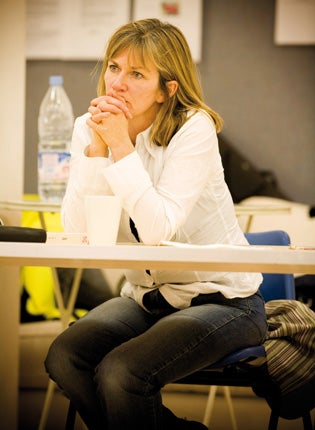Globe stages first play written by a woman
Four hundred years after death of Shakespeare, feminism makes an entrance

Your support helps us to tell the story
From reproductive rights to climate change to Big Tech, The Independent is on the ground when the story is developing. Whether it's investigating the financials of Elon Musk's pro-Trump PAC or producing our latest documentary, 'The A Word', which shines a light on the American women fighting for reproductive rights, we know how important it is to parse out the facts from the messaging.
At such a critical moment in US history, we need reporters on the ground. Your donation allows us to keep sending journalists to speak to both sides of the story.
The Independent is trusted by Americans across the entire political spectrum. And unlike many other quality news outlets, we choose not to lock Americans out of our reporting and analysis with paywalls. We believe quality journalism should be available to everyone, paid for by those who can afford it.
Your support makes all the difference.The Bard is well-known for penning some of the strongest female roles the stage has known, which his company of male players gamely enacted while dressed in drag.
Yet no female playwright had – until now – written a drama for the Globe Theatre. Now, nearly 400 years after Shakespeare's death, feminism has finally made its stage entry at the riverside theatre in London, after Nell Leyshon was named as the first woman to write a play for the vast circular stage.
Ms Leyshon will stage Bedlam, a drama based on the lunatic asylum in the 18th-century, in September. She acknowledged that women had been forced to "prove they can write for such large spaces". "It's a bit belated on the one hand," she said. "Even though a lot of plays have been written by women through the ages."
Dominic Dromgoole, the theatre's artistic director, said the under-representation of women on stage had "been a problem" for theatres.
"There has been a lack of women in theatre as a whole. By and large in history, there are plays by men and about men, with some very extraordinary exceptions. What is great now is the new generation of excellent female playwrights coming through – Lucy Prebble, Polly Stenham and Nell Lyshon – who are redressing the balance," he said.
Mr Dromgoole had, he added, been trying to make this happen ever since he arrived at the Globe four years ago and the "new writing" strand was first launched.
"Ever since I came, I have been looking for a female playwright, not through any kind of positive discrimination, but because some of the best playwrights out there, and the most exciting new voices, are women. I worked with them while I was at the Bush Theatre, and at the Oxford Stage Company. I have asked other female playwrights before but they said 'no' because the (theatre) space didn't work for them," he said.
Ms Leyshon, who has previously written dramas for the Hampstead Theatre and The Lyric, in Hammersmith, draws a parallel in Bedlam between the thuggish, alcohol-reliant culture of the 18th-century, which when the play was set, was undergoing a "gin epidemic", and today's binge-drinking society.
"We always sanitise the past but I wanted to write about this period in history when there was a gin epidemic, and when you'd be frightened to go to a West End theatre on your own on a Friday night for fear of being stabbed or mugged," she said.
Her play is on a forthcoming programme which includes a bold interpretation of Shakespeare's Macbeth by Lucy Bailey, whose graphic and violent dramatisation of the Shakespearean tragedy Titus Andronicus four years ago not only led to great critical acclaim but also to scores of people fainting at every performance, with a regular two or three being carted off to hospital with shock. "(Macbeth) is bound to be horrendous (bloody)...it goes with the territory," he said.
The Globe will also present a play that offers a radical reappraisal of the beheaded Queen of England, Anne Boleyn, written by Howard Brenton, who will show her as a "sexually explosive woman" who was no mere victim or manipulator as she has previously been depicted, but a key player in "making the Reformation stick in England".
Join our commenting forum
Join thought-provoking conversations, follow other Independent readers and see their replies
Comments